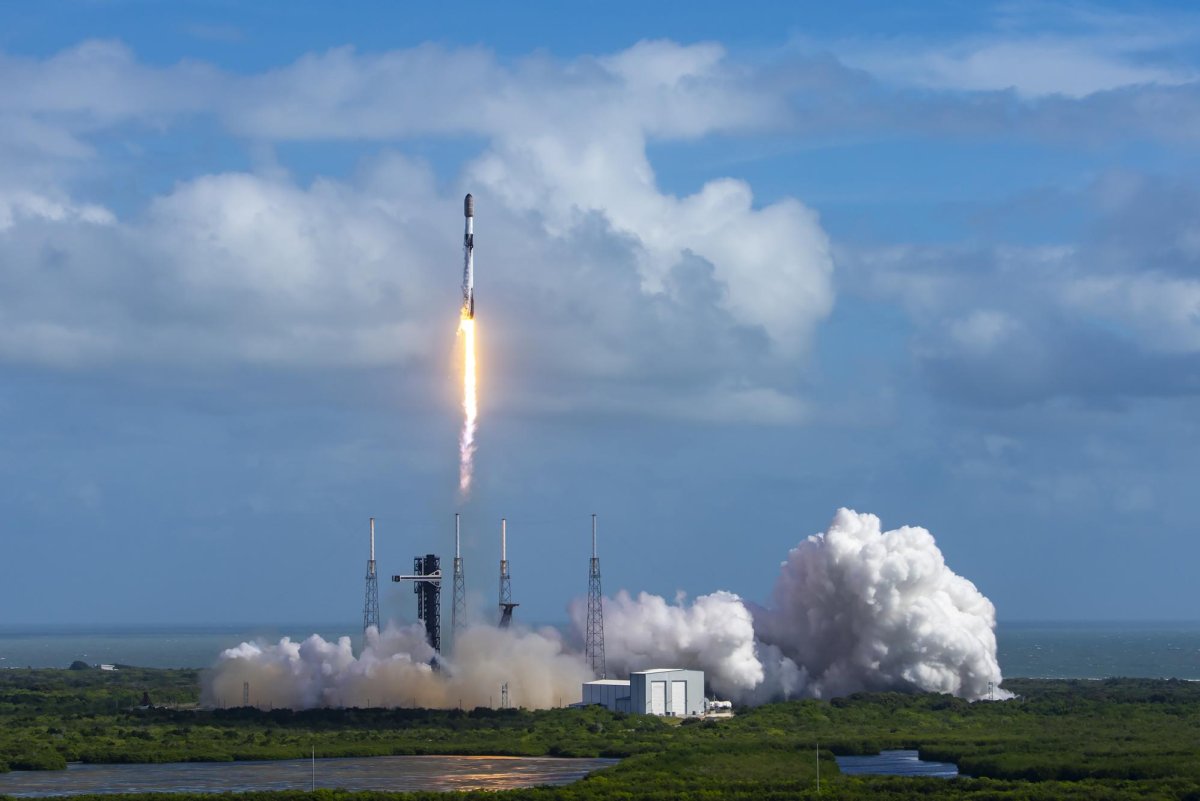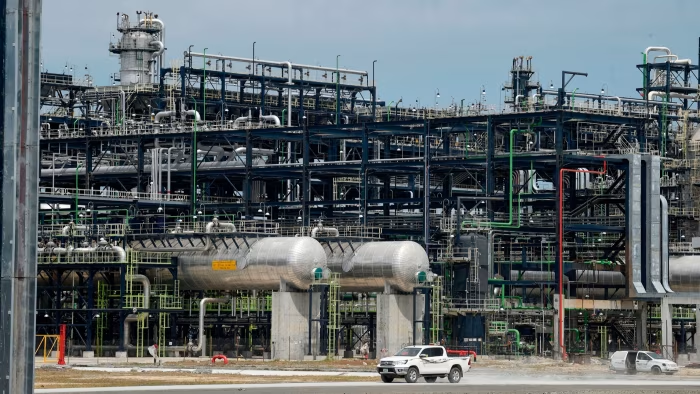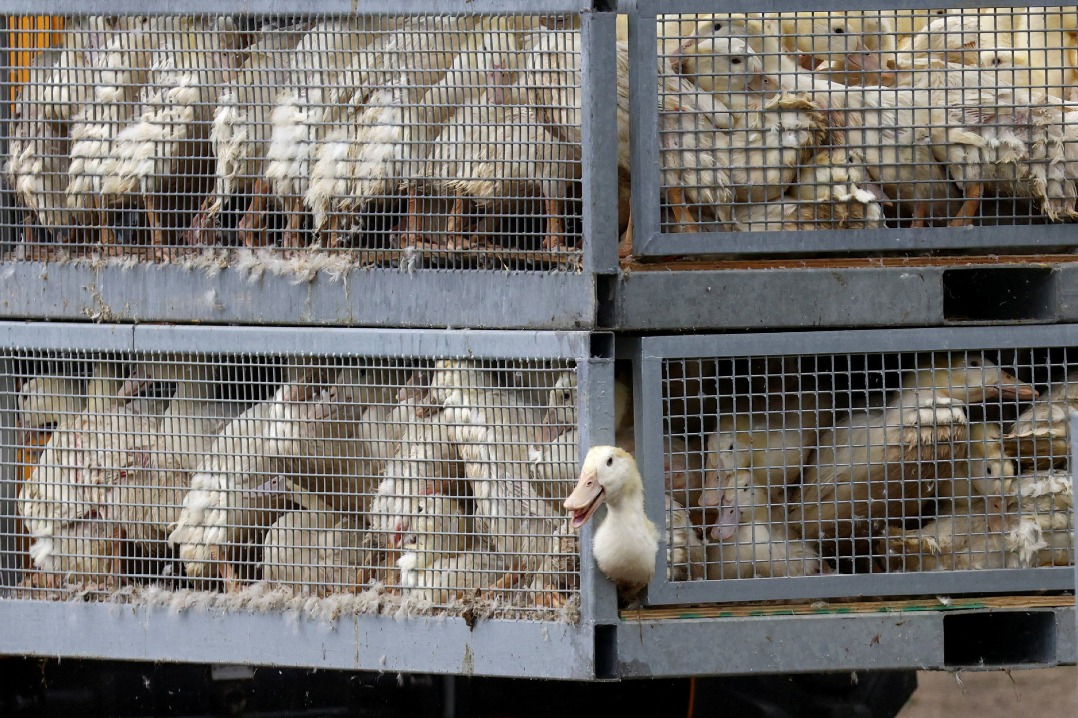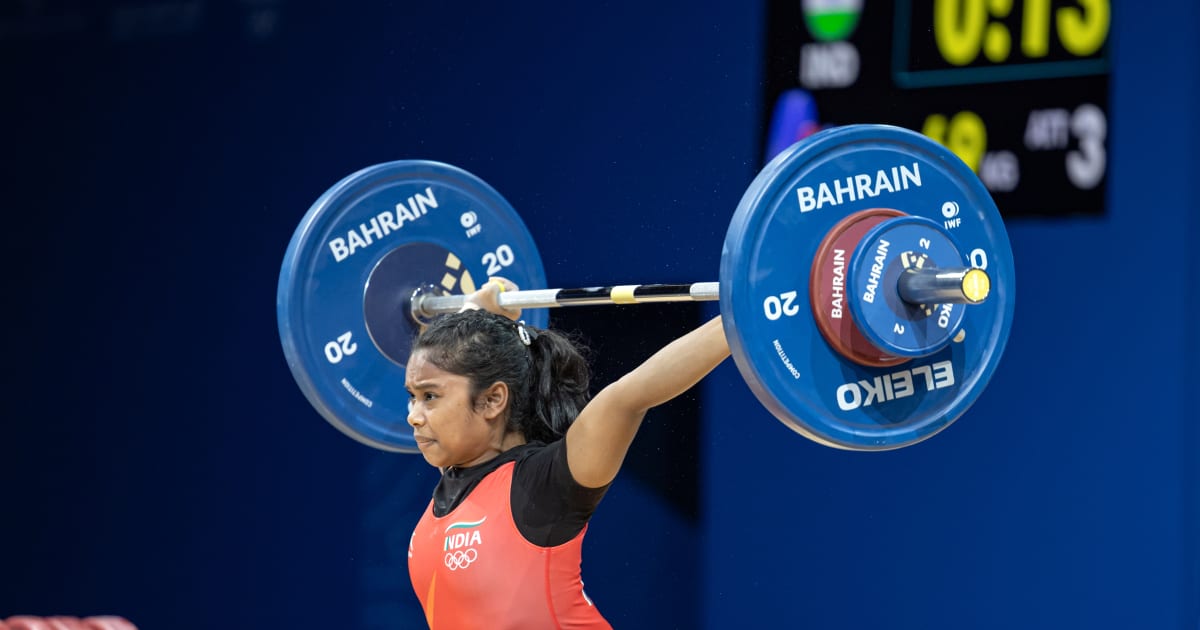Olubukola Ayodele/LinkedIn
Olubukola Ayodele, Breast Cancer Lead at University Hospitals of Leicester NHS Trust, shared a post on LinkedIn:
“A new analysis published in The ASCO…

Olubukola Ayodele/LinkedIn
Olubukola Ayodele, Breast Cancer Lead at University Hospitals of Leicester NHS Trust, shared a post on LinkedIn:
“A new analysis published in The ASCO…

Captain Micky van de Ven led from the front with two headers to inflict Everton’s first defeat at their new stadium as Tottenham moved into third with a 3-0 victory.
David Moyes’ side went from conceding no league goals from corners to two in the…

Oct. 26 (UPI) — SpaceX launched 28 satellites into low Earth orbit just after 11 a.m.. EDT Sunday from Cape Canaveral Space Force Station in Florida, adding to the company’s growing fleet of Starlink communications satellites.
It was SpaceX’s

Stay informed with free updates
Simply sign up to the Oil & Gas industry myFT Digest — delivered directly to your inbox.
Nigeria’s leading industrialist Aliko Dangote is planning to expand capacity at his group’s petroleum refinery to 1.4mn barrels per day and will sell shares in the business to help finance the expansion.
Dangote told the Financial Times he would sell up to a 10 per cent stake in the refinery “depending on what the Nigerian market can take” and is also seeking $5bn in financing from Afreximbank, the African trade bank.
The expansion, which the multi-billionaire industrialist announced in Lagos on Sunday, would make the refinery in Lagos, Nigeria’s commercial capital, rival Reliance Industries’ refinery at Jamnagar in India as the biggest in the world. Jamnagar says it has an output of 1.4mn barrels a day.
The plant, which has an existing capacity of 650,000 barrels per day, has yet to reach full throttle.
However, the plan reflected his confidence in the Nigerian economy and a response to rising regional demand, Dangote said, adding that it would help further reduce the continent’s dependence on imports.
“This expansion reflects our confidence in Nigeria’s future, our belief in Africa’s potential, and our commitment to building energy independence for our continent,” he said.
Dangote is the only African on the Forbes list of the 100 wealthiest people in the world, with an estimated net worth of $26bn.
He said the expansion would require 65,000 workers, most of whom would be Nigerian, and expected it to take three years.
The initial phase of the refinery took nearly a decade to construct from start to finish and cost about $20bn, and Dangote said he had learned lessons from the first phase to reduce the completion time of the second.
George Elombi, the new president of Afreximbank, said his institution was in talks with the Dangote group to provide $5bn in loans towards the expansion.
“We have agreed to look for the money so (the Dangote group) can double production, maximise certain production lines and thereby reduce the price of most of its products,” he told the Financial Times.
This was part of a wider strategy the bank has begun in order to encourage industrialisation and increase support across the continent for the processing of raw materials, he said.
Since it began producing diesel and aviation fuel, and gasoline in 2024, the Dangote group has shaken up the Nigerian oil market, which after years of mismanagement at state-owned refineries had become dependent on costly imports of refined products.
But it faced difficulties at the outset in securing enough oil from Nigeria’s national oil company NNPC, which owns a 7.2 per cent stake in the refinery.
The group sourced crude from around the world with cargoes from Angola, Brazil, Equatorial Guinea, Ghana and the USA to satisfy demand, but has reduced inflows recently in response to rising global prices.
At an Afreximbank event in Cairo on Saturday, Dangote said the refinery construction had been severely disrupted by the Covid-19 pandemic, but previous support from the African trade bank had helped see the project to completion.
“Without Afreximbank the Dangote refinery wouldn’t have been possible,” he said.


The Gulf Cooperation Council (GCC) is fast emerging as a global leader in biotechnology and digital health. This growth is driven by the unique mix of demographic pressures, economic diversification goals, and health security imperatives experienced in these countries. Saudi Arabia and the UAE are leading the sector’s regional expansion: Saudi Arabia’s recent launch of its National Biotechnology Strategy envisions a contribution of US$34.6 billion to non-oil GDP by 2040, while the UAE’s digital health market is forecast to grow by over 23 percent by 2030, pushing the sector to approximately US$2.65 billion in value.
The expansion of such initiatives strengthens GCC countries’ reputations for delivering high-quality healthcare for both locals and expatriates and aligns with wider economic transformation agendas. The biotechnology industry and health tourism sector are lucrative opportunities with estimated values of US$1.5 trillion and US$8.7 billion, respectively.
The biotechnology industry and health tourism sector are lucrative opportunities with estimated values of US$1.5 trillion and US$8.7 billion, respectively.
However, while intensive public and private investment in initiatives such as digital health partnerships, national genome programmes, and AI-driven diagnostics mark major progress, the sector still faces bottlenecks in research infrastructure and data governance. Consolidating these advances through stronger coordination with research institutions and developing comprehensive health data governance frameworks will be key to turning early gains into lasting global leadership.
The Gulf states face a health paradox common to high-income societies: economic gains have brought prosperity and longevity, but also a surge in non-communicable diseases. The WHO estimates that around 74 million people in the Eastern Mediterranean live with diabetes, with prevalence rates in the GCC reaching up to 20 percent. At the same time, life expectancy has risen dramatically from 60 years in the late 1970s to around 83 years in 2025 in the UAE, with similar trends observed across the five other GCC states. This puts increasing pressure on both hospitals and home-based care services, given that 80 percent of healthcare needs typically occur post-retirement age.
To meet these needs, states are seeking to implement new technologies within their healthcare offerings. Saudi Arabia’s Digital Health Strategy and Roadmap explicitly includes remote monitoring, virtual clinics, and the integration of telehealth as priorities under Vision 2030 and related health transformation programmes, incorporating technologies that can provide more accessible healthcare to citizens who may have limited mobility. This is also particularly important given Saudi Arabia’s large population and vast geography, as it enables care delivery to more people without extensive travel. In the UAE, ambitions for the health sector outlined in Vision 2021 and the more recent We the UAE 2031 consist of enhancing quality of life and specialised care offerings by continuing to develop an innovative, state-of-the-art healthcare system. As such, the Department of Health’s (DOH) Policy on Digital Health identifies technologies such as “telemedicine, web-based analysis… wearable devices, and clinic or remote monitoring sensors” as essential for early diagnostics and care management.
Next-generation sequencing and AI are being deployed to analyse population-wide genetic data, identifying variants linked to rare and hereditary disease.
Alongside these efforts, the GCC is deepening its focus on gene mapping and preventative health. The Gulf’s high consanguinity rate among local populations has been a concern for decades, prompting Saudi Arabia to institute a law requiring pre-marital genetic testing in 2002 — the first such law in the region, subsequently adopted across all GCC states. Building on this foundation, targeted testing between couples has now been expanded as governments work to map entire populations. Next-generation sequencing and AI are being deployed to analyse population-wide genetic data, identifying variants linked to rare and hereditary disease. Such projects are essential to the development of “precision medicine”, in which the patient’s specific genetic profile is used to inform and optimise treatment plans rather than relying on generalised clinical guidelines. These programmes also address the Eurocentric bias in earlier datasets, creating population-specific genetic baselines that strengthen diagnostic accuracy.
These initiatives position Gulf countries as leaders in data-driven healthcare, advancing Vision 2030 and We the UAE 2031 goals for economic diversification and improved quality of life. The UAE’s medical tourism market alone was valued at US$334.9 million in 2024, projected to reach US$975 million by 2032. By expanding biotechnology and digital health, both countries aim to extend life expectancy and ease pressure on healthcare systems as populations expand and age.
Biotechnology and digital health initiatives in the GCC are benefiting from significant levels of government commitment and capital investment. The healthcare-focused private equity company Quadria Capital recently allocated a quarter of its latest US$1 billion fund to the GCC, specifying digital health as a key sub-sector for growth and marking the region as a strategic hub for next-generation healthcare innovation. Saudi Arabia’s flagship Global Health Exhibition saw approximately US$13.3 billion in announced healthcare investment in 2024, and has dedicated a considerable tranche of activities and discussions to the topic of “Digital Health” for the upcoming 2025 edition in late October. In the UAE, the Abu Dhabi Department of Health and the Abu Dhabi Investment Office (ADIO) recently signed an MoU with GSK to establish a medical institute in the emirate, focused on integrating genomics data to advance cancer research. Another strength for the region is the positive reaction that genome projects have received from citizens. Because such projects necessitate a vast amount of data, the voluntary participation of citizens is an essential component. Public support is likely thanks in part to the existence of genetic testing as a pre-marital requirement, in addition to strong public messaging and education campaigns in both the UAE and Saudi Arabia that emphasise the transformative potential of AI’s algorithmic analyses and its central place in the GCC’s future economies.
To ensure long-term competitiveness in medical tourism and biotechnology, GCC countries should expand research capacity alongside treatment infrastructure.
However, challenges related to research capacity and infrastructure, which are uneven across the region, remain. While Abu Dhabi’s Masdar City and Dubai Science Park are key host centres for life sciences firms working in genomics and digital health, most clinical research remains concentrated in only a handful of facilities. The UAE, for example, has only eight on-site research centres across its 168 inpatient facilities. This is also true of Saudi Arabia, where specialist institutions like King Abdullah International Medical Research Center (KAIMRC), King Abdullah University of Science and Technology (KAUST), and King Abdulaziz City for Science and Technology (KACST) are impressive, but relatively few in number compared to global leaders in life sciences innovation, such as the US and Switzerland. To ensure long-term competitiveness in medical tourism and biotechnology, GCC countries should expand research capacity alongside treatment infrastructure. Developing research ecosystems would likely attract more global talent while simultaneously increasing economic gains by driving high-value innovation. In addition, future policy development in the evolving landscape of global data governance must balance security with flexibility — strong enough to guard against high-profile data breaches that have become a persistent risk across the sector, yet open enough to encourage biotech investment. Focusing on research depth and trusted data systems will position the GCC as a secure and innovation-driven healthcare hub.
Over the past decade, the GCC — led by Saudi Arabia and the UAE — has laid the groundwork for a modern, innovation-driven healthcare landscape. Through large-scale investment in the sector, including digital health initiatives and national genome programmes, the region is positioning itself as a global hub for precision medicine and data-driven health innovation. These initiatives address the challenges of population growth, increased life expectancy, and lifestyle-related diseases while supporting broader diversification goals under Vision 2030 and We the UAE 2031. Yet, progress remains uneven, particularly in research infrastructure and regulatory coherence — areas that will determine whether current momentum translates into lasting global influence.
The strong investment trends in the wider sector should be matched by greater allocations toward building specialised research institutions to enable the region to generate original medical advances.
Given that it is the UAE’s ambition to become a global destination for specialised care and Saudi Arabia’s mission to further encourage a competitive environment among healthcare providers, research capacity must become a priority. The strong investment trends in the wider sector should be matched by greater allocations toward building specialised research institutions to enable the region to generate original medical advances. In addition, GCC countries should seek to continuously advance and refine their health data regulations while avoiding overburdening market actors with excessive compliance duties, thereby balancing investor confidence with robust safeguards for privacy and ethical use.
This commentary was originally appeared on ORF Middle East.
The views expressed above belong to the author(s). ORF research and analyses now available on Telegram! Click here to access our curated content — blogs, longforms and interviews.

India’s Priteesmita Bhoi created a new weightlifting world youth record on Sunday by successfully lifting 92kg in the clean and jerk section of the girls’ 44kg category at the Asian Youth Games 2025 in Manama, Bahrain.
The record mark earned…